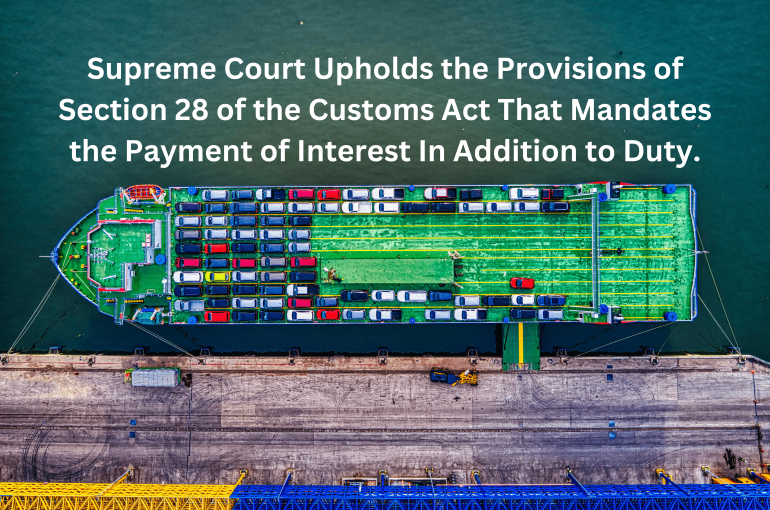Supreme Court Upholds the Provisions of Section 28 of the Customs Act That Mandates the Payment of Interest In Addition to Duty.
INTRODCUTION
In a recent judgement of M/S Navayuga Engineering Co. Ltd. V. Union of India & Anr. vide Order dated 23/07/2024. The Hon’ble Supreme Court in its judgement discussed the provisions of Customs Act, 1962.
FACTS
A Notification dated 01.03.2002, was issued under the Customs Act, 1962, (hereinafter referred to as “The Act”) wherein it was stated that certain self-propelled hydraulic piling rigs were to be utilised specifically for the purpose of construction of roads, bridges etc for National Highways Authority of India (NHAI) and Public Works Department (PWD).
Between the period of 2003-2007, the Appellant availed the benefit of the same Notification, by getting an exemption from the payment of customs duty. Upon investigation, it was found that the Appellant has violated the import conditions. Prior to the issuance of the show-case notice, the Appellant deposited a sum of Rs.16,29,22,282/- and interest of Rs. 1,84,39,696/-.
Thereafter, a show-cause notice was issued under Section 111(o) for confiscation of goods valued Rs. 48.55 crores. Also involving duty liability of Rs. 17,37,57,039/- under Section 28, and interest under Section 28AB and penalties under Sections 112(a) and (b) and 114A of the Act.
Under Section 127B of the Act, the Appellant filed an Application before the Settlement Commission claiming that none of the conditions of the Notification dated 01.03.2002 were violated.
In order to avoid the legal proceedings, the Appellant agreed to accept the liability with respect to certain adjustments if the Settlement Commission agrees with the same.
The Settlement Commission waived off the penalty and fine, upheld the duty liability and directed it to be recovered. The Settlement Commission further held that after the importation of goods, if the conditions for such import are violated, such goods are liable for confiscation but are redeemable of payment of fine as per Section 125(2) of the Act.
The Settlement Commission followed the decision laid down in the matter of Commr. of Customs (Import) v. Jagdish Cancer and Research Centre [(2001) 6 SCC 483] (hereinafter referred to as Jagdish Cancer case), held that the provisions of the Section 28 and Section 28AB are inapplicable and cannot be attracted in confiscation proceedings. Hence, the interested deposited by the Appellant was directed to be refunded.
The Customs Department then approached the High Court of Bombay, wherein it was held as follows:
1) Interest can be levied only if there is a substantive provision.
2) Section 125 has no such enabling provision.
3) Assessment of Duty must be necessarily done under Section 28
4) If provisions of Section 28 are enabled, then application of Section 28AB is inevitable.
The High Court of Bombay therefore distinguished the present matter from that of Jagdish Cancer case and held that interest is payable under Section 28AB, even if the proceedings are under section 125 of the Act.
The High Court of Bombay further remanded the Settlement Commission to calculate and recover interest under Section 28AB of the Act.
ISSUES
a) Whether there is a liability to pay customs duty, when the confiscated goods are redeemed after payment of fine under section 125 of the Act?
b) What is the true and correct ratio of the decision in Jagdish Cancer case?
c) Whether the liability to pay such duty will include the liability to pay interest on delayed payment under section 28AB of the Act?
ANALYSIS
Whether there is a liability to pay customs duty, when the confiscated goods are redeemed after payment of fine under section 125 of the Act?
The Hon’ble Supreme Court laid down the following two principles:
a) That the owner of the goods has a liability to pay customs duty, even after confiscated goods are redeemed after payment of fine and other charges under Section 125 of the Act.
b) In the proceedings under Section 124 of the Act, the obligation to pay and other charges under Section 125(2) of the Act will arise only when the owner of the goods exercises the option to pay fine for the redemption of goods.
c) What is the true and correct ratio of the decision in Jagdish Cancer case?
In the Jagdish Cancer case , a show-cause notice was issued under Section 124 of the Customs Act demanding customs duty and proposed confiscation under Section 111(o) and penalty under Section 112. The importer contended that as there is no notice under Section 28, the demand and collection of duty are impermissible. the fact that an option under Section 125 was given and it was in fact exercised. Thus, the liability to pay customs duty arose under Section 125(2) and therefore, the Court held that the separate notice under Section 28 is not required.
The Hon’ble Supreme Court recounted the facts and circumstances of the Jagdish Cancer case, and held that when goods are confiscated and subsequently redeemed by paying a fine under Section 125 of the Customs Act, then the calculation, determination or the assessment of such duty cannot be made under Section 28.
Whether the liability to pay such duty will include the liability to pay interest on delayed payment under section 28AB of the Act?
The Hon’ble Supreme Court interpreted the Sections 125(2) and Section 28 of the Act. The Hon’ble Court came to a conclusion that once the provisions of Section 28 are applied for determination of duty obligation arising under Section 125(2), the interest on delayed payment of duty arises under Section 28AB.
JUDEGEMENT
Through the above-mentioned analysis and interpretation of the provisions of the Customs Act, 1962. The Hon’ble Supreme Court upheld the decision of the High Court of Bombay. The Hon’ble Supreme Court further stated that the provisions of Section 28 obligates and mandates the payment of Interest in addition to duty.
Ashita
Legal Associate
The Indian Lawyer





































Leave a Reply